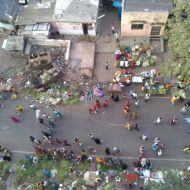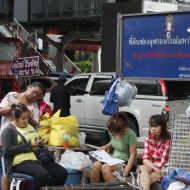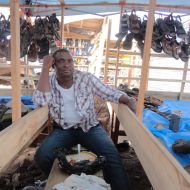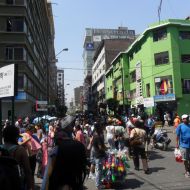Nairobi’s Future Success Demands a Mixture of Competence and Caring
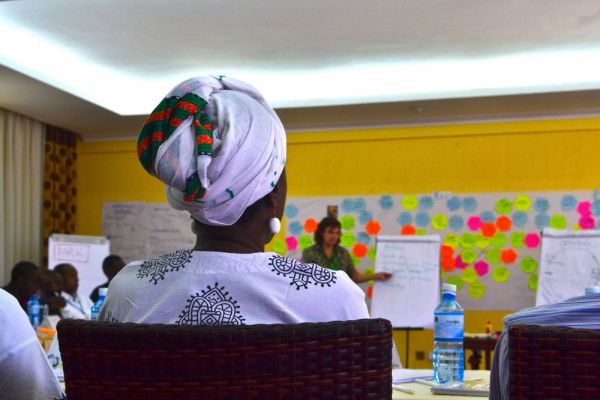
Nairobi’s futures scenario workshops. Photo credit: Sam Sturgis
As the Informal City Dialogues moves toward its “Embracing the Informal City” conference this month, each week we will present summaries of the scenarios created in the six participating cities. These scenarios were created in multi-day workshops planned and conducted by Forum for the Future in conjunction with the Institute for Economic Affairs (IEA-Kenya), and with support from The Rockefeller Foundation. The outputs were collaboratively envisioned by a wide range of actors, from informal settlers and street vendors to urban planners and government officials. The following is an excerpt from Forum for the Future’s report on the scenarios developed in each city, which will be published this month. Click here to read more about how the futures scenarios process works.
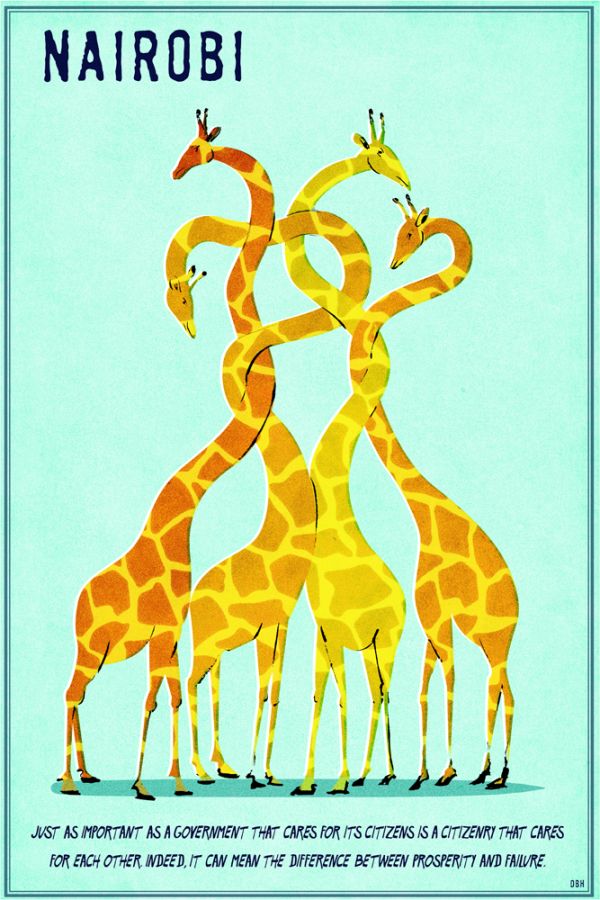
Illustration by Daniel Horowitz
Nairobi
Competence and caring citizens: These are the keys to Nairobi’s prosperous future. Lacking one or both of them, the city will struggle to succeed. In the best-case scenario, a competent county governs caring, inclusive citizens, leading to a future in which quality health care, land tenure and energy resources are secure. An incompetent county, however, suppresses even the best efforts of a caring, inclusive citizenry, who do their best to create informal solutions but are hobbled by failing systems. Conversely, a competent county can only do so much with a populace that is uncaring and exclusive — in this scenario, the informal realm is stifled, apathy is high and innovation is low. The worst-case scenario is an incompetent county in combination with an uncaring, exclusive citizenry, creating a future in which life is a constant struggle, and only the strong survive.
Najivunia
The citizens of Nairobi in 2040 have a strong sense of civic duty and are proud to call the city home. The county government is competent, trusted, and genuinely consultative. Infrastructure and services are mostly adequate—and when they’re insufficient citizens collaborate to fill the gaps. High-quality healthcare is widely available, with costs being shared between the government and the people. Land tenure policy has been reformed and now land is owned by the people who live on it. Most slums have been upgraded to decent low-income housing. Although settlements are denser they’re also better organized. The cost of living is higher, and income equality still persists, but government controls have narrowed the gap between rich and poor. A creative and entrepreneurial class has emerged in Nairobi and the city has become a hub for technology and innovation. The formal and informal sectors are more porous and collaborative, with easier licensing procedures and designated spaces for street vendors. Climate change is being taken seriously by business and government, and substantial investments have been made in renewable energy, smart buildings, wildlife conservation, habitat restoration, and water management.
Bonoko City
In 2040, Nairobi’s government is in the hands of wealthy individuals and corporations who use it to promote their own interests—rather than those of ordinary citizens. Public services have been privatized in the name of efficiency but are poorly run. Water and sewage systems are failing, causing water contamination and the threat of disease. The city’s residents, however, have successfully self-organized to provide themselves with many key services in the absence of effective government—from transportation to banking to housing. The informal sector has become increasingly attractive, and enjoys a largely symbiotic relationship with the formal sector, but is subject to continual suppression by the government.
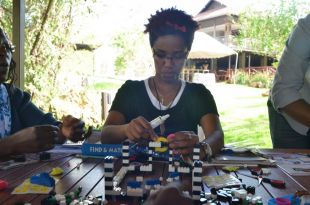
A participant in Nairobi’s innovation workshops. Photo credit: Jason Patinkin
Big Brother City
Nairobi in this scenario is prosperous but stagnant. An effective county government has delivered high-quality infrastructure and services and exercises control over much of society. The city enjoys security, low levels of inequality, and ample job opportunities. However, high taxes and government regulation are stifling innovation. The citizenry is apathetic, individualistic, and wary of outsiders. The media has largely abdicated its oversight function out of deference to the government. The informal economy is considered bad for the city’s image and has largely disappeared.
Vulture City
The prevailing ethos in this scenario is survival of the fittest. Nairobi’s citizens in 2040 are selfish, apathetic, and cynical. The government is ineffective and unable to provide basic services. Poor sanitation in informal settlements causes regular outbreaks of disease. Gangs have come to dominate much of everyday life, including the informal provision of water, electricity, and security. Expensive credit has dampened entrepreneurship and big business is consolidating its advantage through exploitative practices. The informal economy has partly collapsed, due to the high cost of doing business, and people are moving to other cities in search of better opportunities. The city has become more dangerous and the wealthy and middle class have retreated to gated compounds. Citizens innovate in this scenario, but only for survival.


